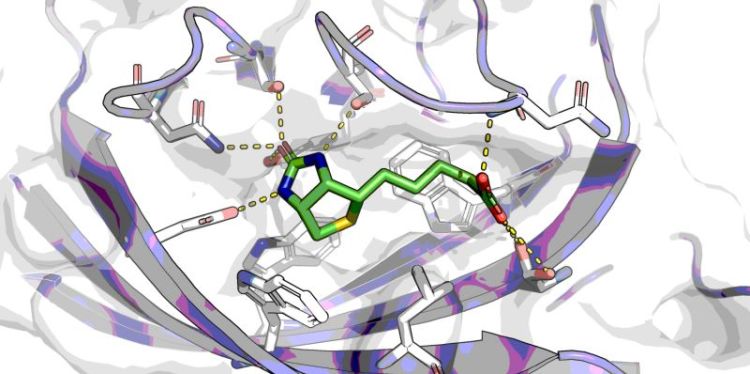Chemistry for Biology and Health

We focus on the application of chemical approaches to problems in biology and medicine. By advancing our understanding of the molecular basis of life, we open new opportunities for treating and preventing diseases as diverse as cancer, cardiovascular disease, infections and neurodegeneration. We also contribute to food security by developing tools to understand and manipulate plant biology.
Our research is underpinned by expertise in synthetic and medicinal chemistry, molecular recognition, protein engineering, enzymology, biophysical and analytical methods and nanoscience. Our work is inherently interdisciplinary and we work closely in collaboration with biologists, clinicians and industrial partners. This research is largely driven through the Astbury Centre for Structural Molecular Biology.
We apply molecular approaches to address major societal and economic problems in biology and health. Research in this area focuses on:
-
Understanding molecular mechanisms in biology and biomedicine
-
Chemical and biochemical methods for labelling biomacromolecules
-
Chemical tools to perturb, label and interrogate biomolecules in cells
-
Engineering biological molecules for synthetic biology and biotechnology
-
Early-stage discovery of drug leads and chemical tools
-
Targeted delivery systems for imaging and/or therapeutics
-
Technologies for diagnosis and treatment of disease
Major research projects and links with industry
Research by members of the section is supported by UKRI, charities and the EU, and we lead and participate in large, multi-centre and multinational projects including:
-
Structures and Probes of Intrinsically Disordered Regions (SPIDR), BBSRC-funded strategic large grant focused on understanding the roles of intrinsically-disordered proteins
-
An EPSRC-funded international Centre-to-Centre collaboration focused on realising autonomous phenotype-directed molecular discovery
-
An EPSRC-funded strategic equipment grant to establish a platform for chemical proteomics
We have strong links to the pharmaceutical and biotechnology sectors, and many projects are undertaken in collaboration with industry. Learn more about them via Pharmaceuticals and Biotechnology Innovations at Astbury.
Facilities
-
A platform for mass spectrometry-based chemical proteomics
-
A suite dedicated to high-throughput analysis and screening of small molecules
-
Instrumentation for high-throughput preparation of peptides, peptidomimetics and peptide arrays
-
Integrated laboratories for chemical biology research including molecular biology, high-throughput protein purification and mammalian cell culture
Access to all major structural biology and biophysical techniques is available through the Astbury Centre for Structural Molecular Biology. The £17 million Astbury BioStructure laboratory has internationally-leading facilities for cryo-electron microscopy, biological NMR spectrometry (up to 950 MHz), bioimaging and biological mass spectrometry.
Research group members
- Paul Beales – membranes and vesicles, artificial cells, drug delivery
- Hannah Britt – mass spectrometry for dynamic disease mechanisms
- Colin Fishwick – medicinal chemistry; structure-based drug design
- Richard Foster – small molecule hit identification and optimisation
- Steve Marsden – bioactive molecule synthesis; hypoxia-sensing molecules
- Martin McPhillie – structure-based drug design and ligand discovery
- Adam Nelson (Head of Section) – high-throughput molecular discovery and chemical probes
- Matthew Quesne – quantum mechanics/molecular mechanics (QM/MM), density functional theory (DFT), catalysis inspired by nature, enzyme modelling
- Paul Taylor – molecular evolution: the origins of neurotransmission
- Bruce Turnbull – glycoscience; targeted delivery
- Stuart Warriner – bioanalytical chemistry; mass spectrometry; peptides
- Mike Webb – protein chemistry and biosynthesis
- Megan Wright – chemical probes and chemical proteomics
- Briony Yorke – time-resolved structural methods development
- Dejian Zhou – nanoparticle tools and theranostic probes
PhD projects
We have opportunities for prospective postgraduate research students. Details of current opportunities are available on the webpages of individual staff members (above), who are also happy to be contacted for further details. In addition to supervising individual PhD studentships, we also participate in interdisciplinary PhD programmes including:
- BBSRC White Rose Doctoral Training Programme in Mechanistic Biology
- MRC Discovery Medicine North Doctoral Training Programme
- EPSRC Centre for Doctoral Training in Molecules to Product
Contact us
If you are interested in collaborating with us, joining our research team, or bringing a fellowship to Leeds, please get in touch with a relevant member of staff. For general enquiries, contact Adam Nelson, the head of the CBH section, via A.S.Nelson@leeds.ac.uk.

